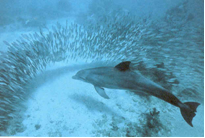

"Our work shows that these adjustments are not necessarily enough to overcome the negative effects of noise on communication between individuals," says King. "If groups of animals in the wild are, for example, less efficient at foraging cooperatively, then this will negatively impact individual health, which ultimately impacts population health," says co-author Stephanie King, associate professor at the University of Bristol, Bristol, UK. While this research was conducted with dolphins living in human care, human-generated noise can potentially have detrimental effects on wild dolphins, too. "Our work shows that despite their attempts to compensate, despite being highly motivated and the fact that they know this cooperative task so well, the noise still impaired their ability to successfully coordinate." "This shows us that despite them using these compensatory mechanisms, their communication was impaired by noise," says Sørensen. As noise levels increased, the dolphins were more likely to re-orient themselves to face each other, and they were also more likely to swim to the other side of the lagoon to be closer. Not only did the dolphins change their calls, but they also changed their body language. From the lowest to highest levels of noise, the dolphins' success rate dropped from 85% to 62.5%. The researchers found that when increasing levels of noise were played from an underwater speaker, both dolphins compensated by changing the volume and length of their calls to coordinate the button press. In the delayed-release trials, the dolphins had to rely solely on vocal communication to coordinate the button press. They were released from a starting point during each trial, and for certain trials, one of the dolphins was held back for five to ten seconds while the other was released immediately. The dolphins had to work together to both press their own underwater button placed at either end of the lagoon within one second of each other. The two dolphins observed in the study, Delta and Reese, were placed in an experimental lagoon and equipped with suction-cup sound recorders to document their vocalizations. "Within the last couple of decades, we've seen a dramatic increase in human-made noise, and noise pollution in the oceans is no exception." "Those same reasons that make sound so advantageous for animals to use also make them susceptible to disturbance from noise in the environment," says first author Pernille Sørensen of the University of Bristol, Bristol, UK.


 0 kommentar(er)
0 kommentar(er)
